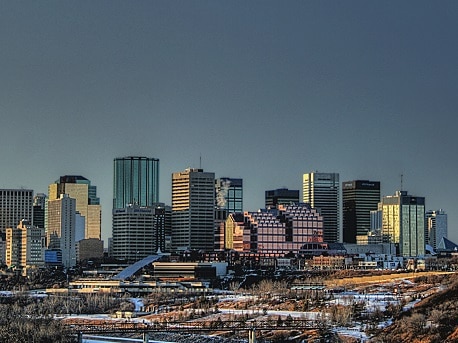
 A new study of air quality in Edmonton, Alberta, finds that over the 8-year period between 2007 and 2014 concentrations of ambient fine particulate matter (PM2.5) in Alberta’s Capital Region remained relatively unchanged, with readings on a few chemical compounds including barium, lead and cadmium showing significant decreases in concentration.
A new study of air quality in Edmonton, Alberta, finds that over the 8-year period between 2007 and 2014 concentrations of ambient fine particulate matter (PM2.5) in Alberta’s Capital Region remained relatively unchanged, with readings on a few chemical compounds including barium, lead and cadmium showing significant decreases in concentration.
The study conducted by researchers at University of Alberta’s School of Public Health looked at data from four air monitoring stations in Edmonton and found that despite experiencing a major population boom during the 2007 to 2014 period (Edmonton took in 177,270 new residents and added 19,800 new vehicles a year during that period), air quality in the Region did not measurably decrease. Researchers noted that there were several instances of increased accumulation of pollutants over the 8-year period but that these were mostly caused by wildfire smoke traveling from outside the Region, sometimes from as far away as Washington State.
“Notwithstanding robust population growth that has occurred in Edmonton, these findings reveal that particulate air quality and corresponding trace elements in Edmonton’s air has been unchanged or improved over the investigated period,” say the study’s authors.
Fine particulate matter is classified as air pollution with material compounds measuring 2.5 microns or smaller (1/30th the width of a human hair). When breathed in, particles that size have the ability to get lodged deep into the lungs and cause a range of health problems from heart disease and stroke to diabetes and neurological disorders, not to mention their effects on visibility and climate change.
Recently, Canada adopted tougher standards for PM2.5 when the Canadian Council for the Ministers of the Environment put in place the new Canadian Ambient Air Quality Standards (CAAQS). Whereas previous regulations called for a 24-hour ceiling of 30 micrograms, the CAAQS puts the ceiling at 28 micrograms, which will be further reduced to 27 micrograms in 2020.
Edmonton’s air quality came into the spotlight last spring when the Canadian Association of Physicians for the Environment reported that winter smog readings between 2010 and 2012 were 25 per cent higher than those in Toronto, a city with five times the population. A higher concentration of vehicles on the road along with emissions from coal-fired electricity plants to the west of the city were said to be primary culprits.
Alberta’s environment minister Shannon Phillips went on record last fall expressing her concern over poor provincial readings on air quality for fine particulate matter, admitting that the province faces serious air quality issues. “We are concerned by these ambient air quality results,” Phillips said, “The previous government resisted meaningful action on air pollution and climate change and today’s results speak to that inaction.”
According to the Pembina Institute’s Chris Severson-Baker, Alberta’s air quality issues are largely a result of oil-and-gas operations, coal plants and vehicle emissions, all of which should be addressed through a robust climate change agenda. “The best thing the Alberta government could do to improve air quality is to take meaningful action on climate change. Measures that tackle carbon pollution would also contribute to cleaner air, so long as they address the biggest contributors to deteriorating air quality in Alberta,” says Severson-Baker.
The new study was published in the journal Environment International.
Comment
One thought on “Edmonton’s air quality is not getting worse, study says”
Leave a Reply
You must be logged in to post a comment.



 Share
Share Tweet
Tweet Share
Share




1) Funded by Transalta
2) The CAPE study looked at the 5% worst days… As defined by the Canada Wide Standards developed by the Canadian Council of Environment Ministers. This looked at average annual concentrations… a completely different measurement.
Just so you know.